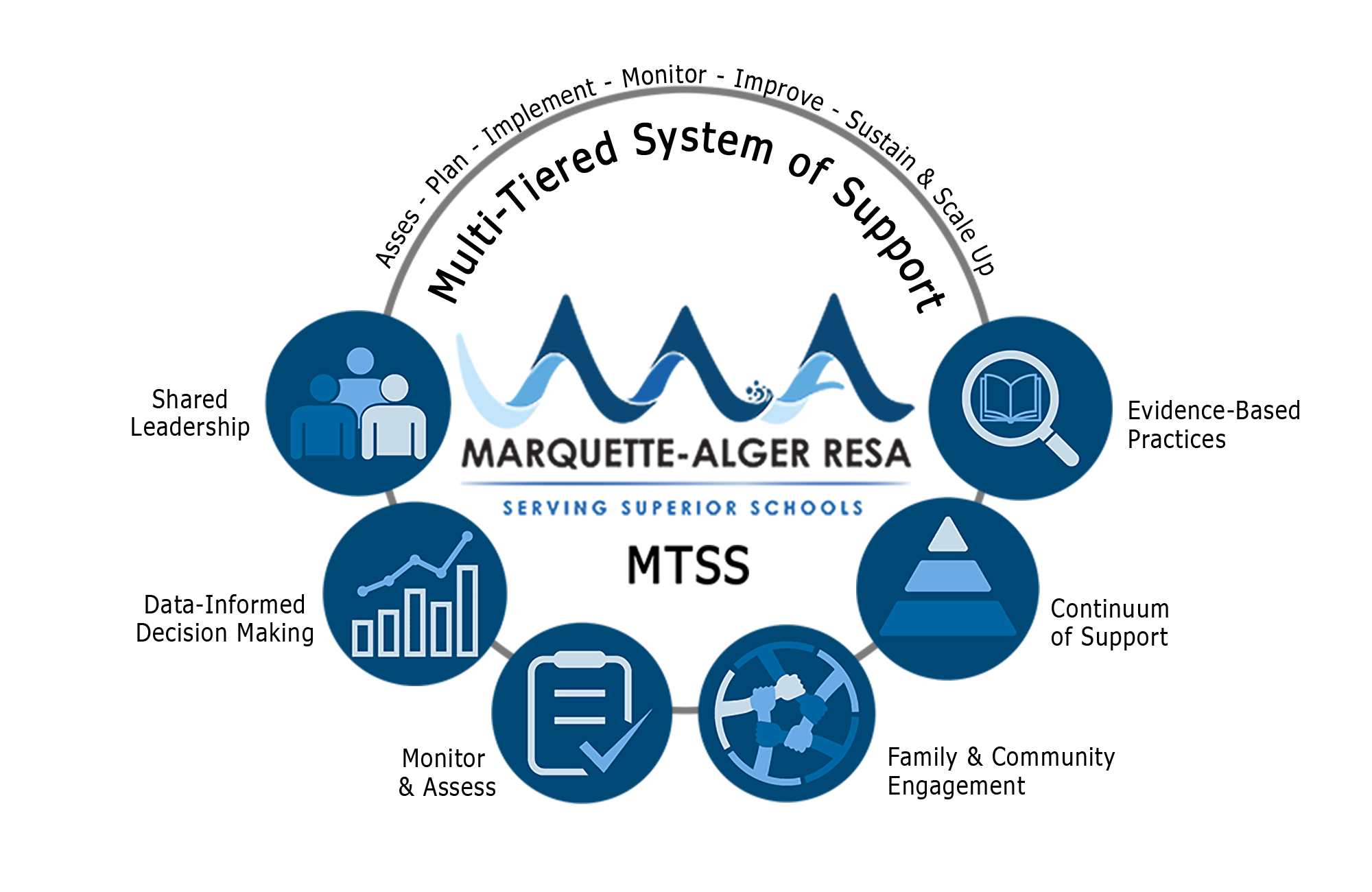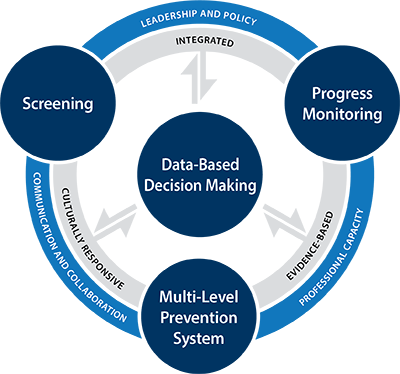Multi-Tiered System of Support (MTSS)

MTSS Review Process

The MTSS review process is a partnership between Marquette-Alger RESA, CAREI (Center for Applied Research and Educational Improvement - University of Minnesota), and the local education agency to review the implementation of MTSS in the school district and develop a plan for supporting implementation efforts to improve student outcomes.
What is MTSS?
Multi-Tiered System of Supports (MTSS) is an educational framework used in schools to provide a systematic, data-driven approach to supporting students' academic, behavioral, and social-emotional needs. MTSS is designed to ensure that all students receive the appropriate level of support and intervention to help them succeed in their educational journey.
The following page outlines MTSS and Marquette-Alger RESA's support of MTSS implementation:
Evidence-Based Practices
Evidence-based practices (EBP) play a crucial role in a Multi-tiered System of Support (MTSS) as they provide a foundation for effective decision-making and intervention at different levels of support. Utilizing evidence-based practices maximizes learning opportunities and improves student outcomes.
Why use Evidence-Based Practices in MTSS?
- Using evidence-based practices ensures that interventions are more likely to produce positive results efficiently, optimizing resources and time.
- The consistent implementation of evidence-based practices across all tiers of MTSS promotes fidelity, meaning that interventions are delivered as intended.
- Evidence-based practices are grounded in research and best practices, ensuring that interventions and teaching strategies are based on the most up-to-date and reliable knowledge in the field.
- The use of evidence-based practices provides a clear standard against which the effectiveness of interventions can be measured.
Continuum of Support
A Tiered Approach to Student Support and Intervention

Tier 1 (Universal - All Students): This level encompasses all students and aims to prevent issues through proactive strategies. It includes quality instruction and positive behavior support for all.
- Quality Core Instruction: In Tier 1, all students receive high-quality, evidence-based core instruction in academic subjects (e.g., reading, math) that aligns with the curriculum standards. This instruction is designed to be accessible and effective for the majority of students in the general education setting.
- Positive Behavior Support: Tier 1 includes strategies for promoting positive behavior and social-emotional skills. It involves creating a positive and inclusive school climate where expected behaviors are explicitly taught and reinforced.
- Preventative Measures: Tier 1 emphasizes proactive, preventative strategies to address potential challenges. It aims to prevent academic, behavioral, and social-emotional issues before they escalate.
Tier 2 (Targeted - Some Students): Targeted support is provided for individuals or small groups of students with specific needs. Interventions are more specialized, and progress is closely monitored.
- Identification: In Tier 2, students are identified through data analysis and assessment as needing more specific support due to their academic, behavioral, or social-emotional challenges. These are typically students who have not responded to Tier 1 interventions.
- Customized Support: Tier 2 interventions are tailored to the individual or small groups of students. These interventions are designed to address the specific areas of need identified in each student. For example, this could involve targeted reading support for students struggling with literacy or social skills training for those facing social-emotional challenges.
- Progress Monitoring: Progress is closely monitored to assess the effectiveness of Tier 2 interventions. Data is collected regularly to determine whether students are making progress and whether adjustments are needed.
Tier 3 (Intensive - Individual Students): The most intensive support is reserved for individuals who require specialized, individualized interventions. This tier includes more intensive assessments and highly individualized plans.
- Individualized Plans: In Tier 3, students receive highly personalized intervention plans tailored to their specific needs. These plans are developed through a thorough assessment of the student's strengths, weaknesses, and areas of concern.
- Specialized Instruction: Interventions at this level may involve one-on-one instruction or very small-group settings to address the most significant academic or behavioral challenges. Special education services may also be included for students with disabilities.
- High Frequency and Duration: Tier 3 interventions are more intense, with increased instructional time and ongoing support. They often extend beyond the regular classroom schedule.
Monitor & Assess
A fully implemented Multi-Tiered System of Support utilizes assessment and monitoring to identify where students are in their learning and what interventions will best support their achievement. This includes Universal Screening and Progress Monitoring.
Universal Screening
Universal screening is a systematic process within MTSS that involves assessing all students to identify those who may need additional support in academic, behavioral, or social-emotional domains. The goal of universal screening is to identify students who may be at risk for challenges early on, allowing for timely intervention and support.
Key features of universal screening in an MTSS include:
- Comprehensive Assessment: Universal screening involves assessing all students, typically using standardized tools or measures. These assessments cover a broad range of skills and behaviors, providing a comprehensive overview of students' strengths and areas where they may need additional support.
- Early Identification: The primary purpose of universal screening is to identify students who may be at risk for academic, behavioral, or social-emotional difficulties at an early stage. Early identification allows educators to intervene promptly, addressing potential issues before they become more significant challenges.
- Preventive Approach: Universal screening aligns with the preventive philosophy of MTSS by identifying potential challenges early in the educational process. The goal is to prevent academic or behavioral difficulties from escalating by addressing them proactively through targeted interventions.
- Regular and Periodic Administration: Universal screening is typically conducted regularly and periodically throughout the school year to monitor students' progress and identify emerging needs
Progress Monitoring
Progress monitoring is a systematic and ongoing assessment process within MTSS designed to track students' academic, behavioral, or social-emotional progress over time. The primary purpose of progress monitoring is to evaluate the effectiveness of interventions and instructional strategies, enabling educators to make data-driven decisions about the level and type of support needed for individual students.
Key aspects of progress monitoring in an MTSS include:
- Data-Driven Decision Making: The data collected through progress monitoring drive decision-making within the MTSS framework. Educators use the ongoing data to evaluate the impact of interventions, make adjustments as needed, and determine if a student should continue, intensify, or change their level of support.
- Individualized Monitoring: Progress monitoring is often individualized to each student's needs and the goals of their interventions. It allows educators to track progress toward specific, measurable objectives tailored to the student's unique challenges and strengths.
- Goal Setting and Planning: Progress monitoring supports the process of setting realistic and achievable goals for students based on their individual needs. Educators can use the data to plan and adjust interventions that align with these goals.
- Evaluation of Intervention Effectiveness: The primary purpose of progress monitoring is to evaluate the effectiveness of interventions. Educators can assess whether students are making sufficient progress, and if not, they can make informed decisions about modifying or intensifying interventions.
Data-Informed Decision Making
 Data-informed decision-making is a crucial component of MTSS, as it helps educators make informed choices about instruction, intervention, and support. Schools regularly review and analyze data to refine their practices and make adjustments to better meet the needs of their students.
Data-informed decision-making is a crucial component of MTSS, as it helps educators make informed choices about instruction, intervention, and support. Schools regularly review and analyze data to refine their practices and make adjustments to better meet the needs of their students.
Here's how data-informed decision-making is used in MTSS:
- Schools collect data through universal screenings to identify students who may need additional support.
- Data helps in determining the appropriate tier of support for each student based on their needs.
- Data collected from ongoing assessments help educators understand whether the interventions are effective and whether adjustments are needed.
- Data helps in determining when to move a student between tiers or when to intensify or reduce interventions.
- Professional development can be targeted based on the data to enhance teachers' skills in delivering effective instruction and interventions.
- Schools can use data to allocate resources efficiently, ensuring that interventions and supports are directed where they are most needed.
- Data can be shared with parents to keep them informed about their child's progress and involve them in decision-making processes related to interventions.
Shared Leadership
MTSS uses a shared leadership model through the use of Multi-disciplinary teams. These teams typically consist of professionals from various disciplines, such as general education teachers, special education teachers, administrators, school psychologists, counselors, and other specialists. By combining expertise from different disciplines, the team can gain a comprehensive understanding of students' needs and strengths.
Here's how shared leadership and multi-disciplinary teams are used in MTSS:
- Multi-disciplinary teams collaborate to analyze data collected through screenings, assessments, and progress monitoring.
- Collaborative problem-solving helps determine appropriate interventions and support strategies for individual students or groups of students.
- For students requiring more intensive support, the team collaborates to create individualized plans that address academic, behavioral, and social-emotional needs.
- The team identifies areas where professional development is needed for educators and staff.
- Multi-disciplinary teams work together to allocate resources, including personnel, materials, and technology, to support interventions and services.
- Multi-disciplinary teams communicate with parents about their child's progress, share information about interventions, and seek input from parents in the development and review of individualized plans.
- The team engages in ongoing reflection and data analysis to refine and improve MTSS practices.
Family & Community Engagement
Family and community engagement in a Multi-Tiered System of Support is significant because it fosters a collaborative, holistic, and culturally responsive approach to student success. There is a shared responsibility among educators, families, and the community to support students academically, socially, and emotionally, leading to a more comprehensive and effective education system.
The significance of family and community engagement within MTSS can be understood in several ways:
- Engaging families and the community enables educators to tailor support that addresses not only academic needs but also social, emotional, and cultural factors influencing a student's development.
- In a successful MTSS, responsibility for student success is shared among educators, families, and the community.
- When all stakeholders are actively involved, there is a collective commitment to providing the necessary resources and support systems to help students succeed academically and thrive in their personal development.
- Effective family and community engagement facilitate open lines of communication between schools and families.
- Collaborative efforts ensure that everyone is on the same page regarding a student's progress, interventions, and strategies. This collaboration strengthens the overall support network.
- Family and community engagement contribute to cultural responsiveness within the school environment.
- Active engagement with families ensures that potential issues are identified early, allowing for timely and appropriate interventions to be implemented through the MTSS.
- Engaged families become advocates for their children and are empowered to actively participate in decision-making processes related to their education.
Jonathan Young
Director of Multi-Tiered System of Support (MTSS)
Phone: (906)226-5179

